#review
Text
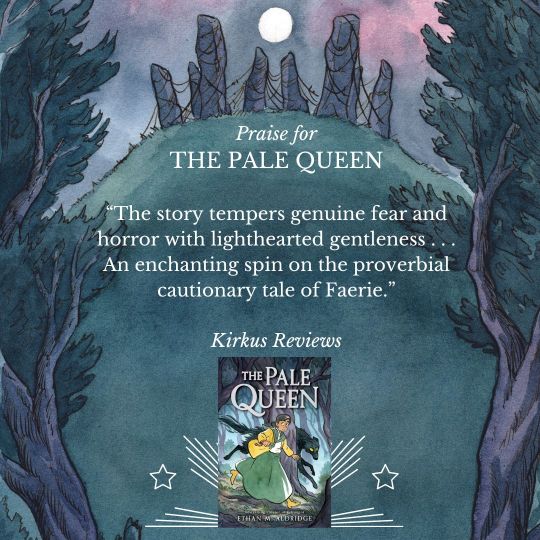
The first big review for The Pale Queen, and it's glowing! Kirkus calls the story "enchanting."
You can read the full review here
And you can preorder the graphic novel here before it hits shelves this June!
41 notes
·
View notes
Text
Alrighty! @number-one-shadisper-shipper and I binged the Knuckles series today, so time for thoughts! SPOILER ALERT.
I'll admit the show wasn't perfect. I've seen the negative reviews, and I kinda get where they come from. BUT! I did enjoy this show greatly! And I'm not here to complain. Time for some happy thoughts, y'all! 💙🤩
I think you need to have a love, not just tolerance, for the SCU in order to properly enjoy this show. I do have such, so I had a lot of fun with it.
There were definitely scenes from every episode that had me either squealing, laughing, crying, or flipping out. But my favorite was likely the first episode, because come on, we saw the Wachowski family! Most of them, anyway! While I missed Tom's presence, I was grateful for that comment from Maddie about him being "out of town," so he wasn't just gone for no reason.
The SECOND it showed our three space babies hanging out together in their room?! I SCREAMED. THE BOYS!!!!

Tails sitting on his bed tinkering with one of his gizmos, Sonic rocking out to music with an air guitar, and Knuckles exercising from one of the ceiling planks. IT'S THEM!!! They're just hanging out, doing their thing, looking oh so much like brothers. And Sonic's narration at the beginning was GOLD. 🤣💙
Even though we didn't get enough of Maddie being a parent, we definitely got a nice chunk for it only lasting part of an episode. Maddie called Knuckles "one of our kids" (that had me SCREECHING). The angry mama vibes were GOLDEN. 🤣 The way she made breakfast for them, the "Boys, breakfast is ready!" I love the normalcy of it! Can't wait to see more in the future! (Her calling to them with "boys" is somehow just the sweetest thing and I'm melting.)
The poor mailman being like "I just wanna go home, man" 🤣
We were right, fellas, Knuckles had no idea what being grounded meant. 🤣 Although the way Sonic piped up with "Oh, I definitely know what it means," has me suspecting that Sonic himself has gotten grounded a decent amount before. 😂
Knuckles trying to talk back, and Maddie going, "ExCUSE ME?!" then just making those tiny, terrifying noises and Sonic being like "Bro don't mess with Mom when she's mad" (okay, he didn't say "mom" and that made me sad, but the mom vibes were 110% there so I'm here for it). 😂 And since Knuckles snuck out and later Wade said, several times, "Aren't you grounded?" seems to confirm that this entire show is basically what Knuckles does when he's grounded. 🤣 Although ... his comment about not being able to be grounded because he had no home made me very sad. 😭
I did not have an issue with so much Wade screentime! Sure, he isn't my favorite SCU character, but I love what this show did with him! I'd already seen his moments in the movies (like nearly shooting Robotnik in the face with an actual handgun). I like how they gave him actual family issues; a dad who abandoned him and his family, a realistic sister, a mom. Bad family memories. Awkward reunions. They could've made it a joke, but they didn't, and I greatly appreciate that. Especially since I've witnessed firsthand how painful family separations can be. 😔
All the emotional talks Wade and Knuckles had caught me off guard in the best way! The way they talked about their different family issues, the way they talked of betrayal from friends, and being left alone, hit way harder than I was prepared for. Especially that talk they had at the burger place in the middle of the night? Oof. Good talk right there.
Also, even though they took a "show don't tell" take with it, I loved how Knuckles relaxed more and more throughout the show. In the beginning, he couldn't rest, he couldn't sit back and have a genuine good time. But the more he hung out with Wade and his family, the more he learned. He learned about music and found "his jam" (that was literally amazing btw). He watched movies with Mrs. Whipple and ate snacks in the hotel room in Reno and watched more movies. He had his teenager moments of rolling his eyes and rebelling, but he was so well portrayed here, I loved it. I felt for him.
Despite the bizarre nature of the episode "Flames of Disaster," (we were cracking up so hard) I'm trying to glean bits of the truth of Knuckles's story from the crazy musical play that Pachacamac put on in Wade's dream. I mean, "Longclaw" and her tribe were there, and ... what the heck was that giant demon thing?! Iblis?! Does our Knuckles Wachowski have an actual history with freaking Iblis?!?! 😱🔥
I was deeply intrigued by the two main antagonists, especially at the implication that G.U.N. did seem to exist before the events of the first movie?! Did it exist, get disbanded after the Maria incident, then get reformed?! My brain is exploding. 🤯 I was even more shocked that they apparently died? I guess I shouldn't be surprised, the Wachowski kids don't seem to have much qualms about getting rid of the baddies for good as the game versions do. That was a terrifying phenomenon, what happened with the two rings. 🫣
And then the Buyer getting crushed by the giant glass ball 👀
Although in those last two episodes, I admit I was freaking out and legitimately near tears at Wade's seemingly having to "betray" Knuckles. Before the reveal that all was in good communication, all I could think was how relaxed Knuckles finally seemed, chilling in the hotel room, being excited about whatever Wade wanted to "show" him, questioning whether it was a song, him declaring that he was going to bring his favorite hat, 🥹 all I could think was of their previous discussions about betrayal from friends and family, and when Knuckles called Wade "my friend" right before the elevator doors closed, I just about sobbed. I was like "please, don't let him be betrayed, don't let him have come all this way and relaxed so much only to get 'betrayed' once again by someone he's come to consider a friend." 😭 We heaved a HUGE sigh of relief when it revealed he was aware of the trap the whole time. 😪
Maternal instincts went nuts when he got so badly hurt in that final battle 😭 I literally reached for the screen several times and was right back to almost weeping 🥲 And someone tell me I wasn't the only one noticing the parallel in that scene with Wade standing in front of his unconscious body the way Tom did with Sonic in the first movie. That, PLUS Knuckles's epic comeback, and his retrieval of his own power?!?! EPIC!!!!
The ending was abrupt, sure, but the pure joy on Knuckles's face after everything as he jumped up to high five Wade was just too sweet. 🥹
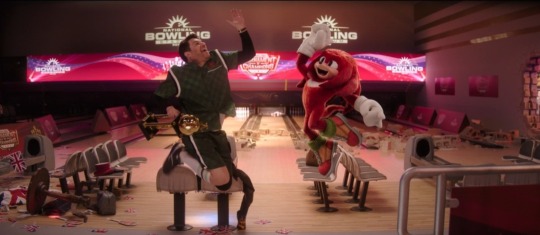
So yes, even though I would have loved just a little more, a return to Green Hills, a reunion with Maddie, Sonic, and Tails, I adored this show. It was a wild ride, full of laughs, tears, excited screeching, etc. 💙💛❤️ I don't care what anyone says, nothing will make me hate it.
#sonic the hedgehog#sonic#knuckles series#knuckles series spoilers#spoilers#knuckles#knuckles show#knuckles wachowski#sonic wachowski#tails wachowski#maddie wachowski#the buyer#review#positivity#positive review#IT WAS SO MUCH FREAKING FUN#sonic cinematic universe#scu#wade whipple#no hate to wade you hear me#none#any hate replies or anything will be deleted#this is a positivity zone#i am here to have fun not complain#i will have all the fun and no one can stop me#sth
49 notes
·
View notes
Text
Oh. Oh Laios. We've all been there, haven't we.
And ofc Laios is annoying but Falin is attractive. Falin is manic pixie dream girl, the same traits in a guy are insufferable.
(It's dehumanising for everyone)
30 notes
·
View notes
Text
Mere days after winning “Artist of the Year” at the inaugural Northern Music Awards, Louis Tomlinson is celebrating the only way he knows how – by giving back. Tomlinson just dropped a surprise album, which includes a curated list of live performances over the past years. It’s a risky move, as live albums are notoriously difficult to make worthwhile. But there’s no doubt about it: Tomlinson is deserving of that award, and the recordings on Louis Tomlinson: LIVE deserve to live forever.
After an initial stop-start to his solo career, Tomlinson has certainly flourished since finally getting to hit the stage. He’s been touring extensively over the past few years, performing a mix of tracks from his first two albums. Both were solid records that heavily referenced anthemic, rich sonic soundscapes. In fact, Tomlinson previously admitted that he wrote certain tracks with a live show in mind. Indeed, songs like “Face The Music,” “Out Of My System” and “The Greatest,” from his No. 1 selling album Faith in the Future, absolutely benefit from the live instrumentals compared to their studio versions.
It isn’t often that live performances consistently seem to not only live up to but objectively improve the perfectly engineered studio recordings. Perhaps it’s the love that the album so clearly captures for live music that does it. The singer-songwriter is an avid fan of his own fans and gets to share a collective experience of joy with them. Just listen to the crowds serenading Tomlinson in return during “Chicago,” recorded live in – you guessed it, Chicago. From Tomlinson’s perspective, audiences across the world have always been part of breathing life into these live recordings. Now, people get to live that same experience with him by listening to this record that is woven together with impeccably mixed joyful screaming in the background.
Tomlinson’s storytelling isn’t hindered by the crowd’s reaction. Rather, it is bolstered by it. In both power ballads like “Common People” as well as raucous tracks like “Silver Tongues.” The live setting seems to function almost akin to a prism – each song shining brighter, richer, fuller. Perhaps the only track that is tighter in the original version, is the seductive “Written All Over Your Face.” Nonetheless, the instrumental break and palpable, wild excitement make for an enjoyable listen.
Similarly, right in the middle of the highly addictive “All This Time/We Are Beauty” mash-up, a fan can be heard screaming “I love you” if you listen closely. The sheer adulation of the crowd is decidedly earned. Tomlinson has worked hard to prove himself, despite never having lacked the talent. Perhaps merely the confidence that he could do it, would do it, has done it. Nevertheless, he’s been open about the tension between his own love for music, and his at times debilitating need for perfection. As he’s settled into his career, a quiet undertone of determination and grit, of relief and fulfillment – of gratitude remains in every single show.
On “Saturdays,” you can actually hear Tomlinson mumble that the view’s never been better from where he’s stood on stage. It’s a high-maintenance track with all the right ingredients for a Tomlinson classic. There’s confessional lyricism, emotive delivery, and a gradual yet powerful crescendo in musical arrangement. It needs to be sung with conviction, and it’s clear that Tomlinson pulls power from the audience to deliver.
Notably, none of the covers that Tomlinson frequently incorporates in his concerts made it onto this live album. With that in mind, perhaps this release signals that Tomlinson has finally embraced his own artistry. Because if anything, Louis Tomlinson: LIVE is a reckless celebration record. An ode to joy, the synergy between artist and audience, and the impact of well-timed, flawlessly executed live guitar solos.
23 notes
·
View notes
Text

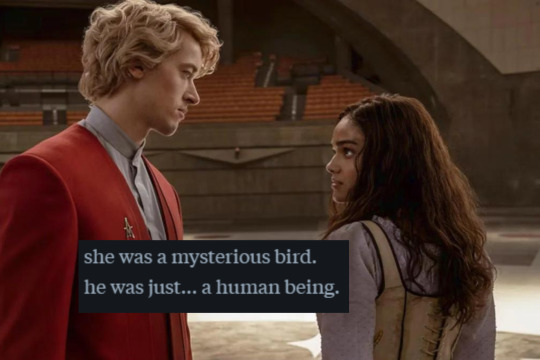

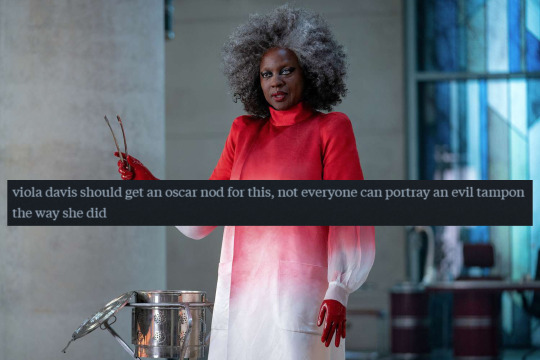

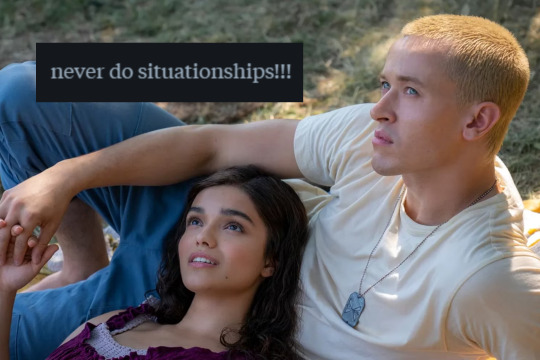

More BOSAS Reviews Pt 3 ⭐
#The Ballad of Songbirds and Snakes#TBOSAS#BOSAS#coriolanus snow#Lucy Gray Baird#volumnia gaul#Review#Funny#The Hunger Games#president snow#hunger games#thg#Funny Reviews#Reviews
4K notes
·
View notes
Text
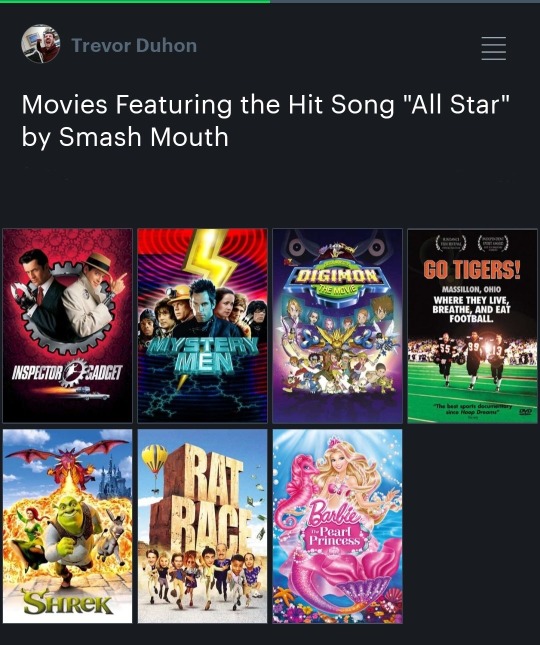
#letterboxd#movie#movie review#movie reviews#movies#movie recommendation#movie recommendations#review#reviews#steve harwell#smash mouth#all star#barbie the pearl princess#rat race#shrek#go tigers#digimon#digimon the movie#mystery men#inspector gadget
6K notes
·
View notes
Text
So, uh, Netflix Avatar, huh? Yeah. I guess I'll make a really long post about it because ATLA brainrot has is a cornerstone of my personality at this point.
So.
It's okay. B, maybe a C+.
That's it.
Now for the spoilers:
The biggest issue with the Netflix version is the pacing. Scenes come out of nowhere and many of the episodes are disjointed. Example: Aang escaping from Zuko's ship. We see him getting the key and going "aha!", and in the next scene he's in Zuko's room. And then he just runs out, no fun acrobatics or fights, and immediately they go to the Southern Air Temple where he sees Gyatso's corpse, goes into the Avatar state, and then sees Gyatso being really cheesy, comes out of it, and resolves that conflict. Nothing seems to lead into anything. The characters don't get to breathe.
The show's worst mistake (aside from Iroh fucking murdering Zhao) is its' first one: they start in the past. Instead of immediately introducing us to our main characters and dropping us into a world where we have a perfect dynamic where Aang doesn't know the current state of the world and Katara and Sokka don't know about the past, thus allowing for seamless and organic worldbuilding and exposition, they just... tell us. "Hey, this is what happened, ok, time for Aang!" There's no mystery, no intrigue, just a stream of information being shoved down the audience's throats and then onto the next set piece.
The visuals are for the most part great, but like with most Netflix productions, they just don't have great art direction. It feels like a video game cinematic, where everything is meant to be Maximum Cool - and none of the environments get to breathe. It's like they have tight indoor sets (with some great set design) and then they have a bunch of trailer shots. It's oozing with a kind of very superficial love.
Netflix still doesn't know how to do lighting, and with how disjointed the scenes are, the locations end up feeling like a parade of sets rather than actual cities or forests or temples. As for the costumes, Netflix still doesn't know how to do costumes that look like they're meant to be actually worn, so many of the characters seem weirdly uncomfortable, like they're afraid of creasing their pristine costumes.
The acting is decent to good, for the most part. I can't tell if the weaker moments come down to the actors or the direction and editing, but if I had to guess, I'd say the latter. Iroh and Katara are the weakest, Sokka is the most consistent, Zuko hits the mark most of the time, and Aang is okay. I liked Suki (though... she was weirdly horny? Like?) but Yue just fell kind of flat.
The tight fight choreography of the original is replaced with a bunch of spinny moves and Marvel fighting, though there are some moments of good choreography, like the Agni Kai between Ozai and Zuko (there's a million things I could say about how bad it was thematically, but this post is overly long already.) There's an actually hilarious moment in the first episode when Zuko is shooting down Aang, and he does jazz hands to charge up his attack.
Then there's the characters. Everybody feels very static - Zuko especially gets to have very little agency. A great example of that is the scene in which Iroh tells Lieutenant Jee the story of Zuko's scar.
In the original, it's a very intimate affair, and he doesn't lead the crew into any conclusions. Here, Iroh straight up tells the crew "you are the 41st, he saved your lives" and then the crew shows Zuko some love. A nice moment, but it feels unearned, when contrasted with the perfection of The Storm. In The Storm, Zuko's words and actions directly contradict each other, and Iroh's story gives the crew (and the audience) context as to why, which makes Zuko a compelling character. We get to piece it out along with them. Here - Iroh just flat out says it. He just says it, multiple times, to hammer in the point that hey, Zuko is Good Actually.
And then there's Iroh. You remember the kindly but powerful man who you can see gently nudging Zuko to his own conclusions? No, he's a pretty insecure dude who just tells Zuko that his daddy doesn't love him a lot and then he kills Zhao. Yeah. Iroh just plain kills Zhao dead. Why?
Iroh's characterization also makes Zuko come off as dumb - not just clueless and deluded, no, actually stupid. He constantly gets told that Iroh loves him and his dad doesn't, and he doesn't have any good answers for that, so he just... keeps on keeping on, I guess? This version of Zuko isn't conflicted and willfully ignorant like the OG, he's just... kind of stupid. He's not very compelling.
In the original, Zuko is well aware of Azula's status as the golden child. It motivates him - he twists it around to mean that he, through constant struggle, can become even stronger than her, than anyone. Here, Zhao tells him that "no, ur dad likes her better tee hee" and it's presented as some kind of a revelation. And then Iroh kills Zhao. I'm sorry I keep bringing that up, but it's just such an unforgiveable thematic fuckup that I have to. In the original, Zhao falls victim to his hubris, and Zuko gets to demonstrate his underlying compassion and nobility when he offers his hand to Zhao. Then we get some ambiguity in Zhao: does he refuse Zuko's hand because of his pride, or is it his final honorable action to not drag Zuko down with him? A mix of both? It's a great ending to his character. Here, he tries to backstab Zuko and then Iroh, who just sort of stood off to the side for five minutes, goes "oh well, it's murderin' time :)"
They mess with the worldbuilding in ways that didn't really need to be messed with. The Ice Moon "brings the spirit world and the mortal world closer together"? Give me a break. That's something you made up, as opposed to the millenia of cultural relevance that the Solstice has. That's bad, guys. You replaced something real with something you just hastily made up. There's a lot of that. We DID NOT need any backstory for Koh, for one. And Katara and Sokka certainly didn't need to be captured by Koh. I could go on and on, but again, this post is already way too long.
It's, um, very disappointing. A lot of telling and not very much showing, and I feel like all of the characters just... sort of end up in the same place they started out in. I feel like we don't see any of the characters grow: they're just told over and over again how they need to grow and what they need to do.
To sum it up: Netflix Avatar is a mile wide, but an inch deep.
#avatar the last airbender#atla#atla spoilers#avatar netflix#netflix avatar#atla live action#netflix atla#zuko#iroh#katara#aang#sokka#zhao#ozai#review
2K notes
·
View notes
Text
my review of serial experiments lain episode 1
hello everybody i just finished watching serial experiments lain episode 1 and wanted to write a review. okay i'm going to start with a plot synopsis so far:
plot synopsis:
the episode starts on a group of scientists all looking at each other in a circle. and one of them says "we have to do experiments on Lain.....in a series" and Lain happens to be passing by right at that moment.
and so another scientist is like "THERE SHE IS, FUCKING GET HER!!!" and they all start chasing after her and she starts running away. most of the episode is a chase sequence with the scientists trying to do the serial experiments and Lain.
at one point there are 2 workers carrying a big glass pane (or, implied to be, as it is totally see-through) and Lain runs right through it somehow but the scientists crash into it. i thought that was silly and liked it.
also at one point the scientists are all running together and they realize there's 1 more of them than there was before, and turns out it's Lain disguised in a labcoat and fake glasses/nose/mustache combo, and she goes "ehe" and does a big bead of sweat as her fake glasses/nose/mustache combo slips a bit. then she zooms away, leaving the labcoat and the fake glasses/nose/mustache combo hanging in the air.
finally, they catch her by throwing a brick at her head
review:
i can see why this is a well regarded series. the gags are good, and i'm left wondering who the scientists are and why they want to do serial experiments on Lain. And I'm also left wondering what the experiments will be and who Lain is. i'm wondering a lot of things and that is a sign of a good series.
i so far give it a 7/10 but will adjust the score based on how funny the experiments are
---
update:
the first experiment is they are making her run a ninja warrior style obstacle course. she has having trouble with the part where you gotta hang on to a swinging punching bag type thing, and keeps falling into the slime. i think i would do better on that part as i have greater upper body strength than a middle school girl
update 2:
they are seeing what the biggest animal is that Lain could beat in a fight
2K notes
·
View notes
Text
Disney's Wish
Look, Disney's Wish has been universally panned across the internet, and for good reason.
It’s just…kind of okay.
When we sit down to watch a Disney film—you know, from the company that dominated the animation industry from 1989 to (arguably) the mid 2010’s and defined the medium of animation for decades—we expect something magnificent. Now, I could sit here and tell you everything that I thought was wrong with Wish, but if you’re reading this review, then I imagine that you’ve already heard the most popular gripes from other users across the web. So, let me focus in:
The biggest problem with Wish—in fact, the only problem with Wish—is Magnifico.
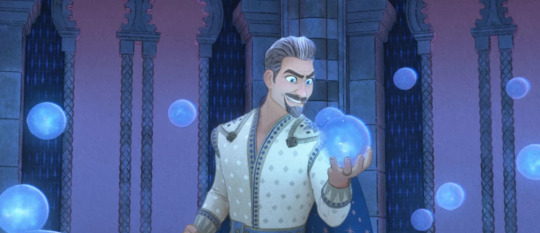
Whoa, that’s crazy! There’re so many things about Wish that could’ve been better! The original concept was stronger! The music was bad--
I hear you, I do. But stay with me here, okay? Take my hand. I studied under artists from the Disney renaissance. I teach an adapted model of Disney’s story pipeline at a University level. I spent a ridiculous amount of time getting degrees in this, and I am about to dissect this character and the narrative to a stupid degree.
First, we need to understand that a good story doesn’t start and end with what we see on the screen. Characters aren’t just fictional people; when used well, characters are tools the author uses (or in this case, the director) to convey their message to the audience. Each character’s struggle should in some way engage with the story’s message, and consequently, the story’s theme. Similarly, when we look at our protagonist and our antagonist, we should see their characters and their journeys reflected in one-another.
So, what went wrong between Asha & Magnifico in terms of narrative structure?
Act I
In Wish, we’re introduced to our hero not long into the runtime—Asha. She’s ambitious, caring, and community-oriented; in fact, Asha is truly introduced to the audience through her love of Rosas (in “Welcome to Rosas”). She’s surrounded by a colorful cast of friends who act as servants in the palace, furthering her connection with the idea of community but also telling us that she’s not of status, and then she makes her way to meet Magnifico for her chance to become his next apprentice.
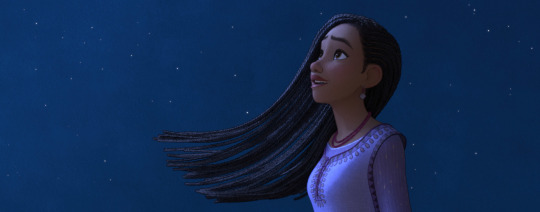
Quick aside: I'm not going to harp on Asha as a character in the context of Disney's overall canon. Almost every review I've seen covers her as a new addition to Disney's ever-growing repertoire of "Cute Quirky Heroines", and I think to be fair to Asha as an actor in the narrative, it serves her best to be weighed within the context of the story she's part of.
As Asha heads upstairs for her interview, we're introduced to the man of the hour: Magnifico. He lives in a tower high above the population of Rosas, immediately showing us how he differs from Asha; he’s disconnected from his community. He lives above them. He has status. While the broader context of the narrative wants us to believe that this also represents a sense of superiority, I would argue that isn’t what Magnifico’s introduction conveys; he's isolated.
Despite this distance, he does connect with Asha in “At All Costs”. For a moment, their goals and values align. In fact, they align so well that Magnifico sees Asha as someone who cares as much about Rosas as he does, and almost offers her the position.
… Until she asks him to grant Saba’s wish.
This is framed by the narrative as a misstep. The resonance between their ideals snaps immediately, and Magnifico says something along the line of “Wow. Most people wait at least a year before asking for something.”
This disappointment isn't played as coming from a place of power or superiority. He was excited by the idea of working with someone who had the same values as he did, who viewed Rosas in the same way he does, and then learns that Asha’s motivations at least partially stem from a place of personal gain.
Well, wait, is that really Asha's goal?
While it's not wholistically her goal, it's very explicitly stated & implied that getting Saba's wish granted is at least a part of it. The audience learns (through Asha's conversation with her friends before the interview) that every apprentice Magnifico has ever had gets not only their wish granted, but the wishes of their family, too! Asha doesn’t deny that this is a perk that she’s interested in, and I don't think this is a bad thing.
So, Is Asha’s commitment to Saba selfless, or selfish? I’m sure the director wanted it to seem selfless, wherein she believes her family member has waited long enough and deserves his wish granted, but we can’t ignore the broader context of Asha essentially trying to… skip the line.

Then, we get our first point of tension. Magnifico reveals his “true colors” in snapping at Asha, telling her that he “decides what people deserve”. This is supposed to be the great motivator, it’s meant to incite anger in the audience—after all, no one gets to decide what you deserve, right? But unfortunately for the integrity of the film and the audience's suspension of disbelief, at least part of Magnifico’s argument is a little too sound to ignore:
Some wishes are too vague and dangerous to grant. Now, there’s visual irony here; he says this after looking at a 100 old man playing the lute. The idea that something so innocuous could be dangerous is absurd, and the audience is meant to agree.
... But we’ve also seen plenty of other wishes that might be chaotic—flying on a rocket to space, anyone? The use of the word vague is important, too—this implies wording matters, and that a wish can be misinterpreted or evolve into something that is dangerous even if the original intent was innocuous. His reasoning for people forgetting their wish (protecting them from the sadness of being unable to attain their dreams) is much weaker, but still justifiable (in the way an antagonist’s flawed views can be justified). The film even introduces a facet of Magnifico’s backstory that implies he has personal experience with the grief of losing a dream (in the destruction of his home), but that thread is never touched on again.
What is the audience supposed to take from this encounter? If we’re looking at the director’s intent, I’d argue that we’ve been introduced to a well-meaning young girl and a king who’s locked away everyone’s greatest aspiration because he believes he deserves to have the power to decide who gets to be happy.
But what are we shown? Our heroine, backed by her friends, strives to be Magnifico’s apprentice because she loves the city but also would really like to see her family's wishes granted. When this request is denied and she loses the opportunity to be his apprentice, she deems Magnifico’s judgement unfair & thus begins her journey to free the dreams of Rosas’ people.
In fairness, Magnifico doesn’t exhibit sound judgement or kindness through this act of the film. He’s shown to be fickle, and once his composure cracks, he can be vindictive and sharp. He's not a good guy, but I'd argue he's not outright evil. He's just got the makings of a good villain, and those spikes of volatility do give us a foundation to work off of as he spirals, but as we’ll discuss in a bit, the foreshadowing established here isn’t used to the ends it implies.
While I was watching this film, I was sure Magnifico was going to be a redeemable villain. He can’t connect with people because he's sure they value what he provides more than they value him (as seen in “At All Costs” and the aftermath), and Asha’s asking for more was going to be framed as a mistake. His flaw was keeping his people too safe and never giving them the chance to sink or swim, and he's too far removed from his citizens to see that he is appreciated. Asha does identify this, and the culmination of her journey is giving people the right to choose their path, but the way Magnifico becomes the “true” villain and his motivations for doing so are strangely divorced from what we’re shown in Act I.
Act II:
His song, “This is the Thanks I Get!?” furthers the idea that Magnifico’s ire—and tipping point—is the fact that he thinks the people he’s built a kingdom for still want more. Over the course of this 3:14 song, we suddenly learn that Magnifico sends other people to help his community and doesn’t personally get involved (we never see this outside of this song), and that he’s incredibly vain/narcissistic (he's definitely a narcissist). I think feeling under-appreciated is actually a very strong motivation for Magnifico as a character-turning-villain, and it works very well. It’s justified based on what we’ve seen on screen so far: he feels under-appreciated (even though he’s decidedly not—the town adores him), he snaps and acts irrationally under stress (as seen with his outburst with Asha), and he’s frustrated that people seem to want more from him (again, as seen with his conversation with Asha in Act I).
But then… he opens the book.
Ah, the book. As an object on screen, we know that it's filled with ancient and evil magic, well-known to be cursed by every relevant character in the film, and kept well-secured under lock and key. But what does it stand for in the context of the narrative's structure? A quick path to power? We're never told that it has any redeeming qualities; Magnifico himself doesn't seem to know what he's looking for when he opens it. It feels... convenient.
I think it's also worth noting that he only turns to the book when he's alone; once again, the idea of connection and community rears it's ugly head! Earlier in the film, Amaya-- his wife-- is present and turns him away from taking that path. In her absence, he makes the wrong choice.
This decision could make sense; it contains powerful magic, and if it were framed in such a way that the people of Rosas were losing faith in Magnifico’s magic, as if what he can do might not be enough anymore after what they felt from Star, going for the book that we know contains spells that go above and beyond what he can already do would be logical. Along the lines of, “If they’re not happy with what I do for them, fine. I, ever the “martyr”, will do the unthinkable for you, because you want more.”

It would keeps with the idea that Magnifico believes he's still trying to help people, but his motivation has taken his self-imposed pity party and turned it into resentment and spite.
But, that’s not the case. Instead he talks about reversing that “light”, which has had no real negative or tangible consequences on Rosas. Everyone had a warm feeling for a few seconds. Again, it’s meant to paint him as a vain control freak, but… he hasn’t lost any power. The citizens of Rosas even assume the great showing of magic was Magnifico.
Act III
Then, we get to the consequences of opening the book (and perhaps my biggest qualm with this film). The book is established as being cursed. Magnifico knows it, Asha knows it, and Amaya—who is introduced as loyal-- knows it. The characters understand his behavior is a direct result of the book, and search for a way to save him. This is only the focus of the film for a few seconds, but if you think about it, the fact that his own wife cannot find a way to free him of the curse he’s been put under is unbelievably tragic. Worse still, upon discovering there is no way to reverse the curse, Magnifico—the king who built the city & “protected it” in his own flawed way for what seems to be centuries—is thrown out by his wife. You know, the wife who's stood loyal at his side for years?
It’s played for laughs, but there’s something unsettling about a character who’s clearly and explicitly under the influence of a malevolent entity being left… unsaved. If you follow the idea of Magnifico being disconnected from community being a driving force behind his arc, the end of the film sees him in a worse situation he was in at the start: truly, fully alone.
They bring in so many opportunities for Magnifico to be sympathetic and act as a foil for Asha; he’s jaded, she’s not. He’s overly cautious (even paranoid), she’s a risk-taker. He turns to power/magic at his lowest point, Asha turns to her friends at her lowest point. Because this dichotomy isn’t present, and Magnifico—who should be redeemable—isn’t, the film is so much weaker than it could’ve been. The lack of a strong core dynamic between the protagonist and antagonist echoes through every facet of the film from the music to the characterization to the pacing, and I believe if Magnifico had been more consistent, the film would’ve greatly improved across the board.
I mean, come on! Imagine if at the end of the film, Asha—who, if you remember, did resonate with Magnifico’s values at the start of the film—recognizes that he's twisted his original ideals and urges him to see the value in the people he’s helped, in their ingenuity, in their gratitude, & that what he was able to do before was enough. Going further, asking what his wish is or was—likely something he’s never been asked— and showing empathy! We’d come full circle to the start of the film where Asha asks him to grant her wish.
Pushing that further, if Magnifico’s wish is to see Rosas flourish or to be a good/beloved king, he'd have the the opportunity to see the value in failing and how pursuing the dream is its own complex and valuable journey, and how not even he is perfect.
The curse and the book (which, for the purposes of this adjustment, would need to be established as representing the idea of stepping on others to further your own goals/the fast way to success), then serve as the final antagonist, that same curse taking root in the people of Rosas who’ve had their dreams destroyed, and Asha works with the community to quell it. Asha’s learned her lesson, so has Magnifico, and the true source of evil in the film—the book—is handled independently. Magnifico steps back from his role as King, Amaya still ends up as Queen, and Asha takes her place as the new wish-granter.
This route could even give us the true “Disney villain” everyone’s craving; giving the book sentience and having it lure Magnifico in during “This is the Thanks I Get!?” leaves it as its own chaotic evil entity.
All in all, Magnifico's introduction paved a road to redemption that the rest of the film aggressively refused to deliver on, instead doubling down on weaker motivations that seem to appear out of thin air. Once the audience thinks, hey, that bad guy might have a point, the protagonist has to do a little more heavy lifting to convince us they're wrong.

Look at the big-bad-greats from Disney's library. There isn't a point in the Lion King where we pause and think, "Wait a second, maybe Scar should be the guy who rules the Pridelands." Ursula from the Little Mermaid, though motivated by her banishment from King Triton's Seas, never seems to be the right gal for the throne. Maybe Maleficent doesn't get invited to the princess's birthday party, but we don't watch her curse a baby and think, Yeah, go curse that baby, that's a reasonable response to getting left out.
What do they all have in common? Their motivation is simple, their goal is clear, and they don't care who they hurt in pursuit of what they want.
Magnifico simply doesn't fall into that category. He's motivated by the idea of losing power, which is never a clear or impactful threat. His goal at the start seems to be to protect Rosas, then it turns into protecting his own power, and then-- once he's corrupted-- he wants to capture Star. The problem is, there's no objective to put this power toward. Power for power's sake is useless. Scar craves power because he feels robbed of status. Ursula believes the throne is rightfully hers. Maleficent wanted to make a statement. Magnifico... well, I'm not really sure.
1K notes
·
View notes
Text
Tiktok sensation LightLark is the final boss of bad fantasy YA— a failure built on aesthetic boards and tropes, unable to pretend it has a heart
Tiktok sensation LightLark is the final boss of bad fantasy YA— a failure built on aesthetic boards and tropes, unable to pretend it has a heart
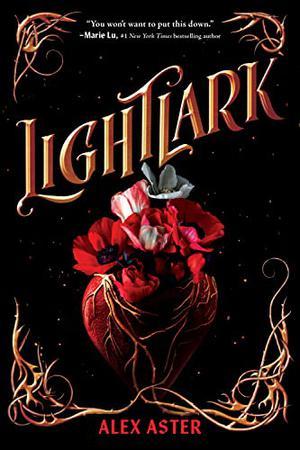
View On WordPress (Includes audio version)
A full summary with spoilers, analysis, quotes- and so much more on the subject of a book you should never read. This is a long piece. Like ‘Youtube Video Essay’ long.
Lightlark is joyless, a husk beyond parody, a checklist of every Island of Blood and Bone and Glass and Hearts that has come out in the last five years, built and sold on tropes and aesthetic boards. This is a book written by an author who is not a writer. It would fit in on the dregs of an amateur writing site with eerie perfection.
But Lightlark is more than that. You see, Lightlark is… a TikTok book.
EDIT:
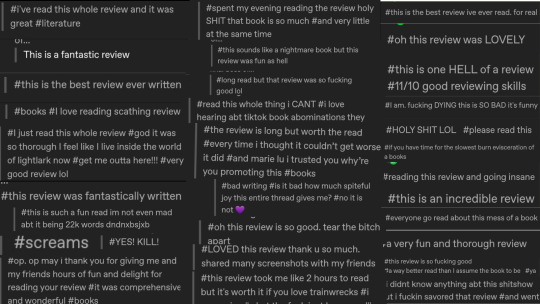
Thanks :')
There's now a video version. I heard Tumblr likes video essay long watches on obscure very specific content... may I introduce you to:
youtube
I'm not making a dime on this, I have no horses, only like 70 hours of work looking at this mess of a book and I just want to make sure everyone knows how bad it is. Let's be bitter at this multimillionaires flop together.
#Alex aster#Book drama#Book Review#booktok#fantasy#fiction#Lightlark#Review#romance#writing#YA#YA books#YA fiction#young adult#Youtube
11K notes
·
View notes
Text
I got my hands on an Alibow Emperor! To see a full review of this gorgeous bow, head over to my youtube channel.
If you'd like to see a preview of some upcoming longer content, I've just put a draft up on Patreon
3K notes
·
View notes
Text
Ngl I’m v disappointed with the ea-Nasir tumblr bracelet I got today. why? Well for starters I thought it would be somewhat adjustable, like maybe the metal would bend a bit so ya know it could stay on your wrist… nope one size fits all unfortunately. Oh well these things happen when you have small wrists it’s fine. What really is bugging me is that the actual cuneiform is printed onto the metal instead of engraved, which would normally be fine but I’ve only had it for a few hours and it already looks like the ink is trying to wipe off and is faded af. 3/10 would not recommend for anything other than sitting on a knick knack shelf
TLDR: don’t buy the ea-nasir tumblr shop bracelets they’re cheap af
#tumblr#staff#tumblr shop#ea nasir#copper#tumblr merch#personal#review#I’m super bummed actually because I was really excited for this#like I almost bought the english and cuneiform versions#now I’m really glad I didn’t#just thought I’d warn others who might be thinking of spending 20 bucks on this thing#emporium#product review
2K notes
·
View notes
Text
An exploration of the depth of a father's love, and his attempts to keep his son happy, healthy and safe in a world rife with racism and violence.
This is one of the best and most impactful episodes of the podcast so far.
#racism#xenophobia#the world wasn’t ready for you#justin c key#levar burton#levar burton reads#podcast#review
702 notes
·
View notes
Text
There was an app that showed a secret camera view of me in class and I had only realized around a year after and I saw a review on the app from my grandma and it said, “It was ok, he slept too much though,” and it was a two star review.
#dream#text#January 7th 2024#app#secret camera#grandma#family#grandmother#review#queueueueueueueueueueueueueue
563 notes
·
View notes
Text
Play of the Week! A new play, performed live, every week, in front of a live studio audience. How wrong could it go?
Okay, I gotta talk about The Goes Wrong Show.
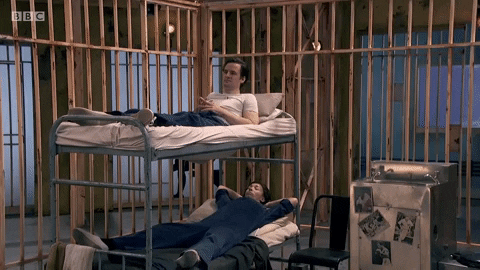
The Goes Wrong Show is something I'm surprised Tumblr hasn't been more up in arms about. This website is, after all, all about committing to the bit. A popular text post by @linecoveredinjellyfish proposed the school of media criticism called "Bitism". And buddy, lemme tell you, The Goes Wrong Show is the patron saint of Bitism. They commit to the bit harder than an alcoholic horse who recently found protestant Jesus.
And it is the funniest goddamn thing I have ever seen.
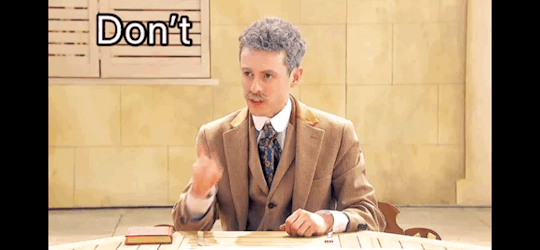
As is so often the case, writing a review of a very good comedy is hard - it's not easy to talk about it without taking some of the oomph out of the jokes. And, make no mistake, The Goes Wrong Show is an incredibly good comedy. I'll try my best anyways, because I cannot stop recommending it, but if you don't need more convincing, just go watch an episode. It's incredible.
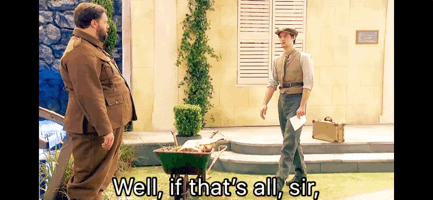
Our framing device is a series of weekly plays put on by an unbelievably incompetent and eclectic drama society, where anything can and probably will fuck up horribly. Terrible acting? A horrific script? Broken props? A set mistakenly built at a 90-degree angle? You name it, they found a way to fuck it up.
But. And this is the key thing. They commit. The script calls for a scene involving pouring tea in a set that's oriented completely wrong? Commit to the bit.

The script demands a period piece family dinner, but something is very wrong with the ceiling fan?
Commit. To. The. Bit.
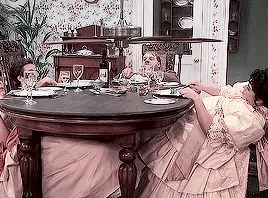
Major actor in the piece is completely incompetent?
Commit.
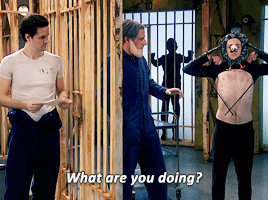
To.
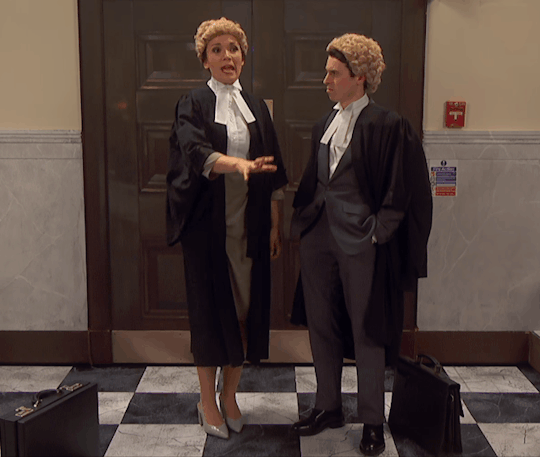
The.
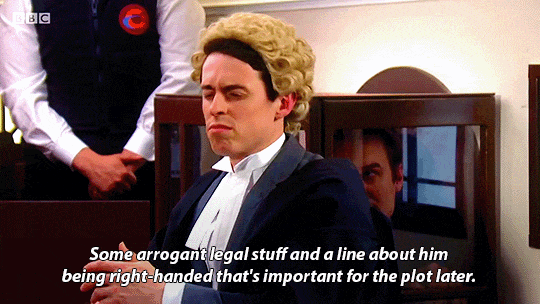
Bit.
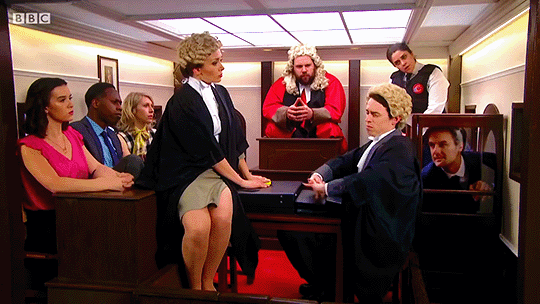
It's an Airplane!-esque barrage of constant absurd gags, and I don't say that lightly. Each member of the cast is distinctly deranged in their own unique ways, the stage management is woefully incompetent, and the special effects are really just a special kind of fucked.
Really, the only complaint I can make of this show is that there isn't more of it, and frankly that's a good problem to have! If you're the kind of person who's not too busy to read a long Tumblr fandom post, but is too busy to binge a series you can get through in an evening, just give s1e3, "A Trial To Watch", a look - in my humble opinion, it is incredibly hard to top.
701 notes
·
View notes
